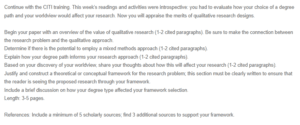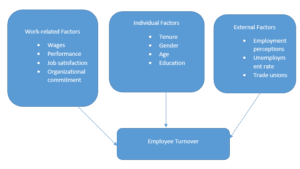Causes and Effects of Employee Turnover in the Hospitality Industry – Casablanca Hotel
Value of Qualitative Research
Qualitative research is the main research method selected for the study on the causes and effects of employee turnover in the hospitality industry based on a case study of Casablanca Hotel. The qualitative research approach aims to develop concepts that can help the research audience understand the causes of turnover in the hospitality industry and understand the perceptions and experiences of employees in the hospitality industry regarding the causes of turnover in the industry. The qualitative research approach was also selected because of its value. According to Agius (2013), qualitative research is the best approach for determining why people behave in a certain way, how people are affected by events, how opinions and attitudes are formed, and how and why practices and cultures have developed the way they are. Therefore, the qualitative research design is essential in the current study because it will facilitate the collection of information that will be used to determine how the opinions and attitudes of employees in the hospitality industry regarding their work environment are formed and how they impact their behaviour, leading to a turnover. Qualitative research also helps refine the research questions for better conceptualization, hypothesis generation, and identification of correct research variables that the researcher should measure to address the research questions (Agius, 2013). Therefore, the qualitative research approach can be used in the current study to generate a hypothesis and determine the variables that should be measured before fully understanding the underlying issues relating to the research study.
Mixed Methods Approach
Although the qualitative research approach has been selected for the current study, the mixed methods approach may also be employed. The mixed method approach includes combining quantitative and qualitative research. The aim of using mixed methods is to combine the benefits of traditional research approaches while minimizing their drawbacks and limitations (Deshmukh & Cornman-Homonoff, 2023). The current study can use mixed methods to analyze the information gathered from the research participants from different viewpoints. Regnault et al. (2018) argue that combining qualitative and quantitative research approaches allows researchers to connect deductive and inductive reasoning to gain a deep understanding of the research questions. Therefore, the mixed methods approach can be employed in the current study to determine appropriate research variables and use them to develop the theoretical framework and themes that will be used to analyze the data gathered from the research participants.
How My Degree Path Informs Research Approach
Organizational leadership is based on behavioural science, which includes applying a scientific approach to understanding human behaviour. According to Bloomberg (2023), qualitative research focuses on promoting a comprehensive understanding of an activity or social setting based on the perspective of research participants. The perspectives can also be used to interpret the participants’ behaviours in a selected setting. Therefore, the organizational leadership degree path informs the qualitative research approach because it relates to understanding and considering human behaviour and opinions when making decisions. My degree path also informs the qualitative research approach because organizational leadership includes scientific inquiry to determine how to address followers’ needs. According to Muhammad et al. (2022), scientific inquiry can only be conducted in a setting where specific attitudes are tolerated or developed. The author adds that scientific inquiry requires skepticism to push the researcher to reevaluate past evidence and reexamine past explanations. Therefore, organizational leadership creates a favourable foundation for qualitative research because it supports scientific inquiry and provides a strategy to understand human behaviour.
How My Degree Path and the Qualitative Research Approach Will Affect the Research
The organizational leadership topics can be reviewed using various forms of scientific inquiry, which create the foundation for qualitative research. According to Lederman et al. (2013), scientific inquiry takes multiple forms, including descriptive, experimental, and correlational designs. Descriptive research focuses on summarizing and describing the attributes of a particular phenomenon or population and can be conducted through surveys, case studies, and observation. Subsequently, correlational research includes determining the relationship between two or more variables without the researcher manipulating or controlling any of the variables. Experimental research, on the other hand, includes gathering information through observation in a controlled environment. The current study comprises descriptive research because it involves a case study of the Casablanca Hotel. The case study will describe the characteristics of employee turnover at the hotel to determine the overall causes and effects of employee turnover in the hospitality industry. The current study may also apply correlational research by using factors that cause employee turnover as independent variables and employee turnover as the dependent variable. Independent variables are defined as the variables that are not impacted by other variables in a research study. Independent variables are mainly the cause of a specific phenomenon in research and are measured independently. On the other hand, dependent variables are defined as variables that are influenced by independent variables. Dependent variables mainly represent the effect in a causal study.
Theoretical Framework
The theoretical framework above indicates the relationship between work-related factors, individual factors, and external factors and employee turnover. The framework suggests that individual, work-related, and external factors lead to employee turnover. According to Al-Suraihi et al. (2021), the factors that contribute to employees’ intention to leave are classified into three categories. The first category is work-related factors. The factors under this category include wages, performance, job satisfaction, and organizational commitment. The second category is individual factors. The main individual factors that impact employee intention to leave include tenure, gender, age, and education. The third category is external factors. The main external factors that may influence employee intention to leave include employment perceptions, unemployment rate, and trade unions. Al-Suraihi et al. (2021) argue that organizational commitment, work environment, rewards, salary, and the type of leader in an organization are vital causes of employee turnover. Therefore, there is a relationship between the selected research topic for the current study and organizational leadership, thus contributing to the appropriateness of the theoretical framework.
Impact of my Degree Path on the Conceptual Framework
The organizational leadership degree path includes understanding the relationship between factors that lead to a specific phenomenon within the organization. Therefore, the degree path influences the conceptual framework by providing a guideline on appropriate variables that can be used to understand and answer the research questions. The degree path also includes understanding how people think and behave in specific situations or the relationships that develop among people over time. Therefore, the study must link the independent and dependent variables related to employee turnover based on the information shared by the participants. The organizational leadership degree path also impacts the conceptual framework because leaders influence the work environment by setting policies and procedures that dictate employee behaviour and what the leader expects. Therefore, organizational leadership concepts can be applied to link the factors that cause employee turnover to employee turnover. The concepts include employee motivation, performance management, compensation, unionization, and employee benefits.
References
Agius, S. J. (2013). Qualitative research: Its value and applicability. The Psychiatrist, 37(6), 204–206. https://doi.org/10.1192/pb.bp.113.042770
Al-Suraihi, W. A., Samikon, S. A., Al-Suraihi, A.-H. A., & Ibrahim, I. (2021). Employee turnover: Causes, importance and retention strategies. European Journal of Business and Management Research, 6(3), 1–10. https://doi.org/10.24018/ejbmr.2021.6.3.893
Bloomberg, L. D. (2023). Completing your qualitative dissertation: A road map from beginning to end. SAGE.
Deshmukh, A., & Cornman-Homonoff, J. (2023). Mixed methods research. Translational Interventional Radiology, pp. 459–462. https://doi.org/10.1016/b978-0-12-823026-8.00078-x
Lederman, N., Lederman, J., & Antink, A. (2013). Nature of Science and Scientific Inquiry as Contexts for the Learning of Science and Achievement of Scientific Literacy. International Journal of Education in Mathematics, Science and Technology, 1(3), 138–147. https://doi.org/https://www.academia.edu/3895649/Nature_of_Science_and_Scientific_Inquiry_as_Contexts_for_the_Learning_of_Science_and_Achievement_of_Scientific_Literacy
Muhammad, J., & Nadvi, M. (2022). Introduction To Social Sciences. In Introduction to Social Sciences (pp. 7–14).Junaid Sons Publications.
Regnault, A., Willgoss, T., & Barbic, S. (2018). Towards the use of mixed methods inquiry as best practice in Health Outcomes Research. Journal of Patient-Reported Outcomes, 2(1). https://doi.org/10.1186/s41687-018-0043-8
ORDER A PLAGIARISM-FREE PAPER HERE
We’ll write everything from scratch
Question
Continue with the CITI training. This week’s readings and activities were introspective: you had to evaluate how your choice of a degree path and your worldview would affect your research. Now you will appraise the merits of qualitative research designs.

Causes and Effects of Employee Turnover in the Hospitality Industry1
Begin your paper with an overview of the value of qualitative research (1-2 cited paragraphs). Be sure to make the connection between the research problem and the qualitative approach.
Determine if there is the potential to employ a mixed methods approach (1-2 cited paragraphs).
Explain how your degree path informs your research approach (1-2 cited paragraphs).
Based on your discovery of your worldview, share your thoughts about how this will affect your research (1-2 cited paragraphs).
Justify and construct a theoretical or conceptual framework for the research problem; this section must be clearly written to ensure that the reader is seeing the proposed research through your framework.
Include a brief discussion on how your degree type affected your framework selection.
Length: 3-5 pages.
References: Include a minimum of 5 scholarly sources; find 3 additional sources to support your framework.


